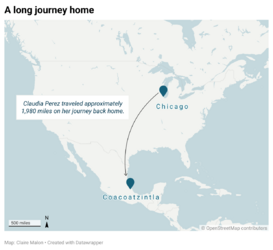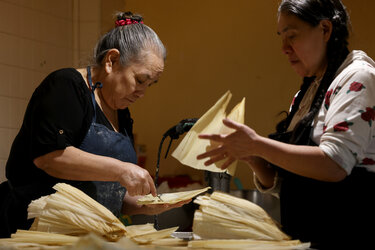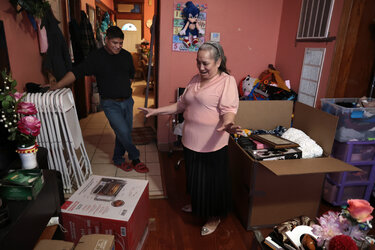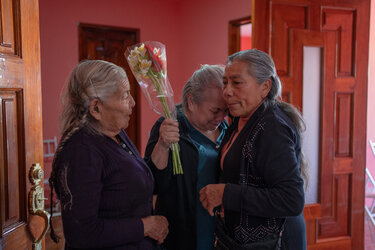After 25 years of selling tamales in Chicago, an undocumented immigrant mother returns to Mexico without her family
Chicago Tribune (archive.ph)
By Laura Rodríguez Presa
2024-04-22 14:21:55GMT

Claudia Perez walks through the municipal pantheon of Coacoatzintla, Veracruz, on Feb. 21, 2024. (Victoria Razo/for the Chicago Tribune)
Claudia Perez’s children could count on one hand the number of times they had seen their father cry.
The day their mother left was one of them.
Perez had worked her whole life for a dream that did not come true: Save enough money to take her family back to Mexico and live together in the town where they were all born.
Instead, on a cold February day, she stepped onto a bus in Brighton Park and said goodbye. The day had come to make the difficult choice between her loved ones in Mexico and her family in Chicago.
“Don’t leave my love. No te vayas viejita,” her husband yelled as she waved goodbye from inside the bus.
Battling health problems and a ticking clock, Perez, 63, chose to leave the life she’d built for herself and her family over the past 25 years. Though she was a successful street vendor in Little Village, she was in the country without legal permission. And she yearned to return to Mexico to hug her aging siblings, visit her parents’ graves and see the houses she’d built for her family using the money she’d earned selling tamales in Chicago.
Her husband, Seferino Arguelles, tried convincing her to wait so that the two could go back together. “Just a couple more years,” he would tell her, urging them to leave the business ready to be passed down. But Perez was afraid that if she waited any longer, she would never return. Not alive at least.
It’s a dilemma that scores of families living in the U.S. illegally experience quietly as the community ages. Some are sick or unable to work, and many immigrants want to make the reverse migration to see their loved ones and homelands before they die. But in doing so, they may never be able to return to the U.S. and see the relatives they left behind.
Over the last several decades, reverse migration of immigrants in the U.S. without legal permission to Mexico has been a slow but steady trend, according to the Pew Research Center and other immigration researchers. The voluntary departures have, in part, kept the population of people in the U.S. illegally at a stagnant number of about 11 million, nearly the same as in 2017, according to Pew, despite the increased number of new migrants crossing the southern border, immigration experts say.
But with comprehensive immigration reform stalled in Congress, and a nation divided on how to resolve it, the choice to stay or go becomes inevitable for some.
Perez and Arguelles had been together for 30 years. In 2002, she and their children left their lives behind in Mexico to be with him in Chicago. “A whole life together,” he said. “Toda una vida juntos.”
When Perez finally returned to Coacoatzintla, Veracruz in February, she sat in one of the homes she had built for their family. Outside, the surrounding green hills turned dark and quiet as the day ended, the surroundings seemingly a world away from the bustling streets of Chicago.
Inside, the walls were freshly painted in bright coral, and the couch was still wrapped in plastic. The kitchen had more cabinets than the street vendor could ever dream of using. It was a house meant to be shared with family.
But her family, also in the U.S. without legal permission, chose to stay in Chicago. They said they weren’t ready to go back. They may never be. If they did, they wouldn’t be able to return to the life they’ve built in Chicago with their U.S.-born children and their careers.
In their minds, they were already home.
“I don’t know when I’ll see them again,” Perez said.

Tamales La Leona
She had named her tamales company La Leona because her husband always said she was strong and fearless, like a lion.
When Perez decided to start selling tamales a few years after arriving in Chicago, she only had about $1,000 saved up to begin the operation. And she didn’t know how to actually make them.
But the factory jobs she and Arguelles had were not enough to support their three children, much less to fufill Perez’s dream of building a home in Mexico.
So she learned to make them, she recalled as she made tamales for the last time in Chicago.
“My husband would tell me I was crazy; that (the business) wouldn’t work out,” Perez said, wrapping the dough in hundreds of corn husks. Still, he made her a wooden cart to sell the tamales.
She’d get up at 2:30 every morning to make the tamales, champurrado and arroz con leche from the small, old kitchen in their apartment. Then she’d be out by 5 a.m. to sell. The pork and green salsa tamales were the customers’ favorites, but she also made green pepper, cheese and red salsa tamales.
Some nights, she didn’t collapse into bed until 11 p.m.
“It was all worth it,” Perez said.

Claudia Perez, left, prepares over 1,000 tamales with Petra Ramirez, one of her two employees at rented kitchen space in Chicago’s Little Village neighborhood on Feb. 9, 2024. (Antonio Perez/Chicago Tribune)
Around 2013, business was so good that Perez moved from making tamales in her apartment to renting a space with a commercial kitchen. She also hired employees to operate six carts across the city.
“It was a profitable business. It gave me everything I have and more to help my family in Chicago and in Mexico,” Perez said. “I loved my job.”
But there were obstacles. Though business took off, she struggled to keep operating because selling tamales on the streets of Chicago was not permitted. Police actively fined and arrested vendors until the City Council pushed for a move to relax the rules in 2015.
Perez became a member of the Asociacion de Vendedores Ambulantes, or the Street Vendors Association, a group of vendors that organized in 2010 to urge the city to pass the now active ordinance that allows vendors to get a license more easily and reduced the cost of the fines.
After she and her children were arrested on multiple occasions for selling tamales, Perez testified before the City Council and spearheaded protests advocating for the ordinance.
“I wasn’t scared to get deported because I wasn’t doing anything wrong. Those laws were absurd,” Perez said.
Her voice was essential to make those changes happen because Perez was “outspoken,” said Martin Unzueta, executive director of Chicago Community and Workers’ Rights.
Just last year Unzueta invited her to join the board of the Street Vendors Association to continue advocating for the rights of immigrant street vendors, but that’s when Perez told him that she planned on returning to Mexico.
“I’m happy she was able to go back,” Unzueta said. “Many of the vendors we work with have that same dream, but they can’t do it.” He said most can’t afford to save for retirement.
Despite Perez’s success, her heartstrings tugged her back to Mexico. She refused to buy a house in Chicago. And she did not cook with the stainless steel and copper bottom pots and pans she’d get on her birthdays because she wanted to save them to use in Mexico.

Claudia Perez and Juan Hernandez, an employee, pack her belongings including stuffed animals, books, mementoes, and two new large screen TV’s for delivery to Mexico, at her home in Chicago’s Little Village neighborhood, Feb. 10, 2024. (Antonio Perez/Chicago Tribune)
She’d send most of the money she made from the business almost weekly to invest in Coacoatzintla, Veracruz, taking a part of the more than $63 billion in remittances sent to Mexico in 2023, with most of the money arriving from the United States, according to Banxico, Mexico’s central bank.
In addition to building her family’s house, Perez built three storefronts on the main road of the small town that she now rents to local business owners. She also built three small apartments for her children and owns 2 acres that she loans to her sister to grow crops.
“She didn’t want anything that would tie her to Chicago,” said her daughter Elizeth Arguelles, 29. “But here we are.”
The days before Perez left, Elizeth’s eyes were red and swollen. She had been crying almost every night. Elizeth had helped her mother sell tamales since she was 9 years old, and the work paid for some of her tuition at Dominican University.
Even though Elizeth is the only one of her siblings with DACA — Deferred Action for Childhood Arrivals — and could maybe visit her mother if she gets approved for advanced parole, the future is all unknown.
“‘She’s not dying,’ I’d tell myself,” Elizeth said, though she added it certainly felt that way. “I’ll see her again one day.”
Time to leave
Over the past years, Perez pushed back the trip. She didn’t want to leave her children and grandchildren behind. Elizeth is the middle child and the only woman. The youngest son, Emmanuel Arguelles, 27, has a son Noah, 7 and her oldest son Uriel Arguelles, 30, has a daughter Melanie, 5.
“But it’s time. I’m tired,” Perez said as she packed the last of six 24×24 boxes to ship to Veracruz. The boxes were filled with mementoes that had decorated her apartment in Little Village: centerpieces from family parties, Elizeth’s soccer trophies, drawings from her grandchildren and photos in which her hair was still dark brown. She had stopped dying it when her oldest son told her that her gray hair made her look wise and powerful.
Arguelles agreed to support her decision to leave because of Perez’s deteriorating health. He could feel her pain at night when they’d lay in bed together. She would sometimes cry because her body ached. But despite her pain, Perez refused to stop working.
About a year ago, she fractured one of her legs, which left her bedridden for more than five months. Her diabetes was worsening and she was diagnosed with shingles.
“I was depressed and desperate because I thought I was going to die without seeing my siblings again,” Perez said. She promised her five siblings when she could walk again she would return to their hometown.

With the lights turned off, family and friends prepare to surprise Claudia Perez during a going away gathering at a local restaurant on Feb. 14, 2024. (Antonio Perez/Chicago Tribune)
Her mother died before Perez moved to Chicago but she also never got to see her father again after she left. He died about 10 years ago. Perez wanted to visit their graves to let them know that she hadn’t forgotten them.
“I didn’t want her to leave, but I realized that if she stayed, she wouldn’t rest because she doesn’t know how to do that here,” her son Uriel said. He paused, trying to find the words to describe his mother. “We’ll have to embrace the memories that we have together and find strength in that. I know we’ll take care of each other from afar.”
Her husband and children promised Perez they would manage the tamale business after she left. Perez and her husband agreed to find a way to smoothly close it down or pass ownership to one of their children before her husband joined her in Mexico.
“I did a lot not to let it all go to waste. Hice mucho para dejarlo todo perder,” Perez said.
Before leaving, Perez made each of her children their favorite dishes. Manjar for Emanuel, buñuelos for Eli, and mole for everyone. She also left thousands of tamales ready to heat up and sell.
“I want to make sure they’re OK without me,” Perez said about the mountains of tamales she left in the large commercial freezers at the warehouse.

Several family members arrive at the home of Claudia Perez to wish her goodbye, Feb. 18, 2024, as she prepares to leave for Mexico. At right is her daughter Elizeth. (Antonio Perez/ Chicago Tribune)

Family members embrace Claudia Perez, Feb. 18, 2024, as she prepares to leave for Mexico. (Antonio Perez/Chicago Tribune)
Everyone loves Perez’s food. It’s turned into the family’s way of sharing their love.
“Don’t go, tia! ¡No se vaya tia! Who is going to make this food?” one of her nephews said at her farewell gathering a few days before she departed.
Perez sat around a table with a centerpiece of her favorite red roses, her loved ones surrounding her. Guests walked in carrying bouquets, which she carefully placed on a table with Polaroid photos of the family.
At the end of the night — nieces, nephews, cousins, aunts and uncles, friends who had turned into family — hugged her goodbye, one by one. Each had come to Chicago from Mexico over the years. Most are here without legal permission.
Perez said that part of the reason she did not legalize her status is because neither she nor her husband have family members to sponsor them to start the process, the most common way to “get in line” with U.S. Citizenship and Immigration Services.
Without a family member who’s a citizen, an employer to sponsor their green card applications or a credible fear of persecution in Mexico that would qualify them for asylum, there was no viable pathway for Perez to apply.
“Why would I want documents now if I’m old? They should have given them to me 25 years ago,” Perez said about the remote possibility of getting a job permit to work in the United States. “Ahorita ya para qué quiero papeles si ya estoy vieja. Me habían dado papeles hace 25 años.”
A bittersweet reunion
It took Perez three days to get to Veracruz from Chicago by bus.
On her way to Mexico, her husband would call her cellphone. “Get off the bus at the next stop it makes before reaching the border. I’ll go get you,” Arguelles would tell her. Her husband and children tracked her location through an app as she traveled south.
She was tired and nervous, but her heart beat faster as she approached the bus station in Xalapa, Veracruz — the city closest to Coacoatzintla — where her older sister, Goya Perez, and her son, whom she calls “El Negrito,” were waiting. She hadn’t seen them in two decades.
As soon as the bus stopped, she got off and rushed toward Goya and hugged her. They were both gray and wrinkled, but their love hadn’t changed.

Samuel Rodriguez Perez embraces his aunt Claudia Perez on her return to her hometown in Coacoatzintla, Veracruz after 25 years of living in Chicago on Feb. 21, 2024, in Xalapa, Veracruz. (Victoria Razo/for the Chicago Tribune)
On the way to their hometown, they laughed as Goya pointed out the new brick homes with large balconies sprinkled among rows of abandoned houses. They’re mostly built with American money by immigrants toiling in U.S. jobs illegally.
When Perez finally arrived at the house she had paid for, her siblings, family, and friends were waiting.
“You are a wise woman who supports and blesses everyone who approaches you. Thank you for your exemplary role. Welcome,” read the message on a cake.
Her brother Goyo Perez, 82, wore a sombrero and walked with a cane. He didn’t leave her side.
“She was like a mother,” Goyo said. “She always takes care of us.”
He had been afraid that he’d die and never see his sister again. It’s not a baseless fear: An estimated 80% of families in their town have loved ones living in the U.S. without authorization. They rely on phone or video calls to celebrate birthdays or to watch funerals.
Most who left, never return. Those who’ve managed to come home, “come back to die,” Goyo said.
Indeed, the same week Perez celebrated her return, she attended the burial of 57-year-old Cupertino Hernandez, one of her nephews. When he died, he had been back in Mexico for only about five months after living in Little Village for more than 25 years, his elderly parents said.
“People don’t realize the cost of the American Dream,” said his mother, Lucia Cordoba Santiago, 78. “A few times it becomes a reality and it costs you a whole life away from those who you love and who love you.”
Amid her mourning, she was happy to see Perez back. It seemed the whole town was.

Claudia Perez cries with emotion to be with her sisters Juana and Gregoria Perez after not having seen them for 25 years since she migrated to Chicago. In Coacoatzintla, Veracruz. Feb. 21, 2024. (Victoria Razo/for the Chicago Tribune)
When Perez ran into people she knew, they would hug tightly. One woman caressed her face as she looked into her eyes as if she was not real: “I never thought I’d see you again.” It was a childhood friend.
Perez smiled and told her the same thing she told everyone: “I’ve been blessed to come back alive and still walking.”
Several weeks after she arrived in Mexico, Perez learned that her father-in-law died unexpectedly in Veracruz. Her husband, Arguelles, was still in Chicago.
After more than two decades apart, he watched the funeral and burial on a video call.
Chicago Tribune (archive.ph)
By Laura Rodríguez Presa
2024-04-22 14:21:55GMT

Claudia Perez walks through the municipal pantheon of Coacoatzintla, Veracruz, on Feb. 21, 2024. (Victoria Razo/for the Chicago Tribune)
Claudia Perez’s children could count on one hand the number of times they had seen their father cry.
The day their mother left was one of them.
Perez had worked her whole life for a dream that did not come true: Save enough money to take her family back to Mexico and live together in the town where they were all born.
Instead, on a cold February day, she stepped onto a bus in Brighton Park and said goodbye. The day had come to make the difficult choice between her loved ones in Mexico and her family in Chicago.
“Don’t leave my love. No te vayas viejita,” her husband yelled as she waved goodbye from inside the bus.
Battling health problems and a ticking clock, Perez, 63, chose to leave the life she’d built for herself and her family over the past 25 years. Though she was a successful street vendor in Little Village, she was in the country without legal permission. And she yearned to return to Mexico to hug her aging siblings, visit her parents’ graves and see the houses she’d built for her family using the money she’d earned selling tamales in Chicago.
Her husband, Seferino Arguelles, tried convincing her to wait so that the two could go back together. “Just a couple more years,” he would tell her, urging them to leave the business ready to be passed down. But Perez was afraid that if she waited any longer, she would never return. Not alive at least.
It’s a dilemma that scores of families living in the U.S. illegally experience quietly as the community ages. Some are sick or unable to work, and many immigrants want to make the reverse migration to see their loved ones and homelands before they die. But in doing so, they may never be able to return to the U.S. and see the relatives they left behind.
Over the last several decades, reverse migration of immigrants in the U.S. without legal permission to Mexico has been a slow but steady trend, according to the Pew Research Center and other immigration researchers. The voluntary departures have, in part, kept the population of people in the U.S. illegally at a stagnant number of about 11 million, nearly the same as in 2017, according to Pew, despite the increased number of new migrants crossing the southern border, immigration experts say.
But with comprehensive immigration reform stalled in Congress, and a nation divided on how to resolve it, the choice to stay or go becomes inevitable for some.
Perez and Arguelles had been together for 30 years. In 2002, she and their children left their lives behind in Mexico to be with him in Chicago. “A whole life together,” he said. “Toda una vida juntos.”
When Perez finally returned to Coacoatzintla, Veracruz in February, she sat in one of the homes she had built for their family. Outside, the surrounding green hills turned dark and quiet as the day ended, the surroundings seemingly a world away from the bustling streets of Chicago.
Inside, the walls were freshly painted in bright coral, and the couch was still wrapped in plastic. The kitchen had more cabinets than the street vendor could ever dream of using. It was a house meant to be shared with family.
But her family, also in the U.S. without legal permission, chose to stay in Chicago. They said they weren’t ready to go back. They may never be. If they did, they wouldn’t be able to return to the life they’ve built in Chicago with their U.S.-born children and their careers.
In their minds, they were already home.
“I don’t know when I’ll see them again,” Perez said.

Tamales La Leona
She had named her tamales company La Leona because her husband always said she was strong and fearless, like a lion.
When Perez decided to start selling tamales a few years after arriving in Chicago, she only had about $1,000 saved up to begin the operation. And she didn’t know how to actually make them.
But the factory jobs she and Arguelles had were not enough to support their three children, much less to fufill Perez’s dream of building a home in Mexico.
So she learned to make them, she recalled as she made tamales for the last time in Chicago.
“My husband would tell me I was crazy; that (the business) wouldn’t work out,” Perez said, wrapping the dough in hundreds of corn husks. Still, he made her a wooden cart to sell the tamales.
She’d get up at 2:30 every morning to make the tamales, champurrado and arroz con leche from the small, old kitchen in their apartment. Then she’d be out by 5 a.m. to sell. The pork and green salsa tamales were the customers’ favorites, but she also made green pepper, cheese and red salsa tamales.
Some nights, she didn’t collapse into bed until 11 p.m.
“It was all worth it,” Perez said.

Claudia Perez, left, prepares over 1,000 tamales with Petra Ramirez, one of her two employees at rented kitchen space in Chicago’s Little Village neighborhood on Feb. 9, 2024. (Antonio Perez/Chicago Tribune)
Around 2013, business was so good that Perez moved from making tamales in her apartment to renting a space with a commercial kitchen. She also hired employees to operate six carts across the city.
“It was a profitable business. It gave me everything I have and more to help my family in Chicago and in Mexico,” Perez said. “I loved my job.”
But there were obstacles. Though business took off, she struggled to keep operating because selling tamales on the streets of Chicago was not permitted. Police actively fined and arrested vendors until the City Council pushed for a move to relax the rules in 2015.
Perez became a member of the Asociacion de Vendedores Ambulantes, or the Street Vendors Association, a group of vendors that organized in 2010 to urge the city to pass the now active ordinance that allows vendors to get a license more easily and reduced the cost of the fines.
After she and her children were arrested on multiple occasions for selling tamales, Perez testified before the City Council and spearheaded protests advocating for the ordinance.
“I wasn’t scared to get deported because I wasn’t doing anything wrong. Those laws were absurd,” Perez said.
Her voice was essential to make those changes happen because Perez was “outspoken,” said Martin Unzueta, executive director of Chicago Community and Workers’ Rights.
Just last year Unzueta invited her to join the board of the Street Vendors Association to continue advocating for the rights of immigrant street vendors, but that’s when Perez told him that she planned on returning to Mexico.
“I’m happy she was able to go back,” Unzueta said. “Many of the vendors we work with have that same dream, but they can’t do it.” He said most can’t afford to save for retirement.
Despite Perez’s success, her heartstrings tugged her back to Mexico. She refused to buy a house in Chicago. And she did not cook with the stainless steel and copper bottom pots and pans she’d get on her birthdays because she wanted to save them to use in Mexico.

Claudia Perez and Juan Hernandez, an employee, pack her belongings including stuffed animals, books, mementoes, and two new large screen TV’s for delivery to Mexico, at her home in Chicago’s Little Village neighborhood, Feb. 10, 2024. (Antonio Perez/Chicago Tribune)
She’d send most of the money she made from the business almost weekly to invest in Coacoatzintla, Veracruz, taking a part of the more than $63 billion in remittances sent to Mexico in 2023, with most of the money arriving from the United States, according to Banxico, Mexico’s central bank.
In addition to building her family’s house, Perez built three storefronts on the main road of the small town that she now rents to local business owners. She also built three small apartments for her children and owns 2 acres that she loans to her sister to grow crops.
“She didn’t want anything that would tie her to Chicago,” said her daughter Elizeth Arguelles, 29. “But here we are.”
The days before Perez left, Elizeth’s eyes were red and swollen. She had been crying almost every night. Elizeth had helped her mother sell tamales since she was 9 years old, and the work paid for some of her tuition at Dominican University.
Even though Elizeth is the only one of her siblings with DACA — Deferred Action for Childhood Arrivals — and could maybe visit her mother if she gets approved for advanced parole, the future is all unknown.
“‘She’s not dying,’ I’d tell myself,” Elizeth said, though she added it certainly felt that way. “I’ll see her again one day.”
Time to leave
Over the past years, Perez pushed back the trip. She didn’t want to leave her children and grandchildren behind. Elizeth is the middle child and the only woman. The youngest son, Emmanuel Arguelles, 27, has a son Noah, 7 and her oldest son Uriel Arguelles, 30, has a daughter Melanie, 5.
“But it’s time. I’m tired,” Perez said as she packed the last of six 24×24 boxes to ship to Veracruz. The boxes were filled with mementoes that had decorated her apartment in Little Village: centerpieces from family parties, Elizeth’s soccer trophies, drawings from her grandchildren and photos in which her hair was still dark brown. She had stopped dying it when her oldest son told her that her gray hair made her look wise and powerful.
Arguelles agreed to support her decision to leave because of Perez’s deteriorating health. He could feel her pain at night when they’d lay in bed together. She would sometimes cry because her body ached. But despite her pain, Perez refused to stop working.
About a year ago, she fractured one of her legs, which left her bedridden for more than five months. Her diabetes was worsening and she was diagnosed with shingles.
“I was depressed and desperate because I thought I was going to die without seeing my siblings again,” Perez said. She promised her five siblings when she could walk again she would return to their hometown.

With the lights turned off, family and friends prepare to surprise Claudia Perez during a going away gathering at a local restaurant on Feb. 14, 2024. (Antonio Perez/Chicago Tribune)
Her mother died before Perez moved to Chicago but she also never got to see her father again after she left. He died about 10 years ago. Perez wanted to visit their graves to let them know that she hadn’t forgotten them.
“I didn’t want her to leave, but I realized that if she stayed, she wouldn’t rest because she doesn’t know how to do that here,” her son Uriel said. He paused, trying to find the words to describe his mother. “We’ll have to embrace the memories that we have together and find strength in that. I know we’ll take care of each other from afar.”
Her husband and children promised Perez they would manage the tamale business after she left. Perez and her husband agreed to find a way to smoothly close it down or pass ownership to one of their children before her husband joined her in Mexico.
“I did a lot not to let it all go to waste. Hice mucho para dejarlo todo perder,” Perez said.
Before leaving, Perez made each of her children their favorite dishes. Manjar for Emanuel, buñuelos for Eli, and mole for everyone. She also left thousands of tamales ready to heat up and sell.
“I want to make sure they’re OK without me,” Perez said about the mountains of tamales she left in the large commercial freezers at the warehouse.

Several family members arrive at the home of Claudia Perez to wish her goodbye, Feb. 18, 2024, as she prepares to leave for Mexico. At right is her daughter Elizeth. (Antonio Perez/ Chicago Tribune)

Family members embrace Claudia Perez, Feb. 18, 2024, as she prepares to leave for Mexico. (Antonio Perez/Chicago Tribune)
Everyone loves Perez’s food. It’s turned into the family’s way of sharing their love.
“Don’t go, tia! ¡No se vaya tia! Who is going to make this food?” one of her nephews said at her farewell gathering a few days before she departed.
Perez sat around a table with a centerpiece of her favorite red roses, her loved ones surrounding her. Guests walked in carrying bouquets, which she carefully placed on a table with Polaroid photos of the family.
At the end of the night — nieces, nephews, cousins, aunts and uncles, friends who had turned into family — hugged her goodbye, one by one. Each had come to Chicago from Mexico over the years. Most are here without legal permission.
Perez said that part of the reason she did not legalize her status is because neither she nor her husband have family members to sponsor them to start the process, the most common way to “get in line” with U.S. Citizenship and Immigration Services.
Without a family member who’s a citizen, an employer to sponsor their green card applications or a credible fear of persecution in Mexico that would qualify them for asylum, there was no viable pathway for Perez to apply.
“Why would I want documents now if I’m old? They should have given them to me 25 years ago,” Perez said about the remote possibility of getting a job permit to work in the United States. “Ahorita ya para qué quiero papeles si ya estoy vieja. Me habían dado papeles hace 25 años.”
A bittersweet reunion
It took Perez three days to get to Veracruz from Chicago by bus.
On her way to Mexico, her husband would call her cellphone. “Get off the bus at the next stop it makes before reaching the border. I’ll go get you,” Arguelles would tell her. Her husband and children tracked her location through an app as she traveled south.
She was tired and nervous, but her heart beat faster as she approached the bus station in Xalapa, Veracruz — the city closest to Coacoatzintla — where her older sister, Goya Perez, and her son, whom she calls “El Negrito,” were waiting. She hadn’t seen them in two decades.
As soon as the bus stopped, she got off and rushed toward Goya and hugged her. They were both gray and wrinkled, but their love hadn’t changed.

Samuel Rodriguez Perez embraces his aunt Claudia Perez on her return to her hometown in Coacoatzintla, Veracruz after 25 years of living in Chicago on Feb. 21, 2024, in Xalapa, Veracruz. (Victoria Razo/for the Chicago Tribune)
On the way to their hometown, they laughed as Goya pointed out the new brick homes with large balconies sprinkled among rows of abandoned houses. They’re mostly built with American money by immigrants toiling in U.S. jobs illegally.
When Perez finally arrived at the house she had paid for, her siblings, family, and friends were waiting.
“You are a wise woman who supports and blesses everyone who approaches you. Thank you for your exemplary role. Welcome,” read the message on a cake.
Her brother Goyo Perez, 82, wore a sombrero and walked with a cane. He didn’t leave her side.
“She was like a mother,” Goyo said. “She always takes care of us.”
He had been afraid that he’d die and never see his sister again. It’s not a baseless fear: An estimated 80% of families in their town have loved ones living in the U.S. without authorization. They rely on phone or video calls to celebrate birthdays or to watch funerals.
Most who left, never return. Those who’ve managed to come home, “come back to die,” Goyo said.
Indeed, the same week Perez celebrated her return, she attended the burial of 57-year-old Cupertino Hernandez, one of her nephews. When he died, he had been back in Mexico for only about five months after living in Little Village for more than 25 years, his elderly parents said.
“People don’t realize the cost of the American Dream,” said his mother, Lucia Cordoba Santiago, 78. “A few times it becomes a reality and it costs you a whole life away from those who you love and who love you.”
Amid her mourning, she was happy to see Perez back. It seemed the whole town was.

Claudia Perez cries with emotion to be with her sisters Juana and Gregoria Perez after not having seen them for 25 years since she migrated to Chicago. In Coacoatzintla, Veracruz. Feb. 21, 2024. (Victoria Razo/for the Chicago Tribune)
When Perez ran into people she knew, they would hug tightly. One woman caressed her face as she looked into her eyes as if she was not real: “I never thought I’d see you again.” It was a childhood friend.
Perez smiled and told her the same thing she told everyone: “I’ve been blessed to come back alive and still walking.”
Several weeks after she arrived in Mexico, Perez learned that her father-in-law died unexpectedly in Veracruz. Her husband, Arguelles, was still in Chicago.
After more than two decades apart, he watched the funeral and burial on a video call.
Last edited: